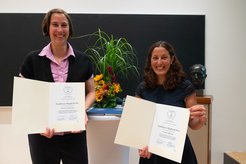Oswalt Foundation for the Promotion of Biophysical Research and its Applications in Medicine Celebrates 100th Anniversary
On the occasion of the jubilee, the Foundation awarded the Frankfurt Biophysics Prize for the first time to Dr. Julia Mahamid and Prof. Dr. Sabine Petry
On July 1, 2022, the Oswalt Foundation celebrated its 100th anniversary at the Max Planck Institute (MPI) of Biophysics with a 1-year Covid-19-related delay. A century of promoting science and technology in biophysics was honored in a festive symposium. The highlight was the first-ever awarding of the Frankfurt Biophysics Prize for outstanding research achievements with a medical perspective, endowed with €50,000. The awardees are Dr. Julia Mahamid from the European Molecular Biology Laboratory (EMBL) in Heidelberg, Germany, and Prof. Dr. Sabine Petry from Princeton University in the US.
Text: Katharina Kaefer
The Oswalt Foundation has been funding biophysical research for medical applications for 100 years. In 1921, the Oswalt Foundation, Institute for Physical Foundations of Medicine, was established by a group of Frankfurt citizens around Henry Oswalt to support research on the medical application of X-rays carried out by Prof. Dr. Friedrich Dessauer. After the Second World War, today’s MPI of Biophysics was founded through financial support by the Oswalt Foundation.
Chaired by Prof. Dr. Ernst Bamberg, Emeritus at the MPI of Biophysics, the Foundation still funds technical developments, seminars, and the career development of young scientists at the Institute, aiming at harnessing research results for novel medical and pharmaceutical developments.

The Oswalt Foundation celebrated 100 years of biophysical research with a scientific symposium and the awarding of the Frankfurt Biophysics Prize to Dr. Julia Mahamid and Prof. Dr. Sabine Petry by Prof. Dr. Ernst Bamberg. Pianist Christoph Ulrich accompanied the event musically. Numerous functionaries from politics and science emphasized the Foundation’s importance for medical research and the successful cooperation and close networking with the Max Planck Society and the Goethe University Frankfurt am Main. Among the congratulators were Angela Dorn, Hessian Minister for Science and Arts, Dr. Bastian Bergerhoff, Finance Officer of the city of Frankfurt, Prof. Dr. Michael Huth, Vice President of Goethe University Frankfurt am Main, Prof. Dr. Clemens Glaubitz, Dean of the Faculty of Biochemistry, Chemistry and Pharmacy, and Prof. Dr. Asifa Akhtar, Vice President of the Biology and Medicine Section of the Max Planck Society.
The fascinating talks given by the two laureates and the group leaders of the Max Planck Institute of Biophysics at the Oswalt Symposium showed how biophysics and structural biology contribute to the understanding and therapy of diseases, for example by studying the spike proteins on the surface of the Sars-Cov-2 virus or the disposal of defective and malfunctioning cellular components.
Julia Mahamid and Sabine Petry Have Been Successfully Studying The Structure of Cellular Proteins for Years
Dr. Julia Mahamid received the Frankfurt Biophysics Award for her outstanding contributions to the advancement of cryo-electron tomography and the imaging of cellular architecture. She received her PhD in structural biology from the Weizmann Institute of Science in Israel in 2010. During her time as a postdoctoral researcher at the Max Planck Institute of Biochemistry in Munich, she achieved a breakthrough in visualizing the environment of the cell nucleus using cryo-EM. Her high-resolution images provided new insights into the structure of nuclear pore complexes consisting of thousands of proteins and into the lamina located directly under the nuclear membrane, which has a supporting function but is also involved in cell division and proliferation. Since 2017, she is a group leader at EMBL and has been continuously developing light and electron microscopy methods to image the structure of large protein complexes in the cell at high resolution.
Prof. Dr. Sabine Petry, who studied Biochemistry at Goethe University Frankfurt am Main, has been awarded the Frankfurt Biophysics Prize for her outstanding contributions to the biophysical characterization of the cytoskeleton and the emergence of cellular structures. During her PhD at the University of Cambridge in the UK, she was involved in unraveling the structure of an important protein involved in the synthesis of new proteins in the cell. Her professional journey then took her to the University of California in the US as a postdoctoral fellow in 2008 and to Princeton University as a professor in 2013, investigating the structure and dynamics of the cytoskeleton. This complex network of proteins stabilizes the cell, and plays an important role in cell division and cellular material transport.
Further Reading:
Oswalt-Stiftung:
https://www.oswalt-stiftung.de/100-jahre-oswalt-stiftung/
Julia Mahamid (EMBL):
https://www.embl.org/people/person/caa57916a44e260711819f20e4b7e13665dd556b7821582042a5ac5f808ad524/
Sabine Petry (Princeton):
https://molbio.princeton.edu/people/sabine-petry









